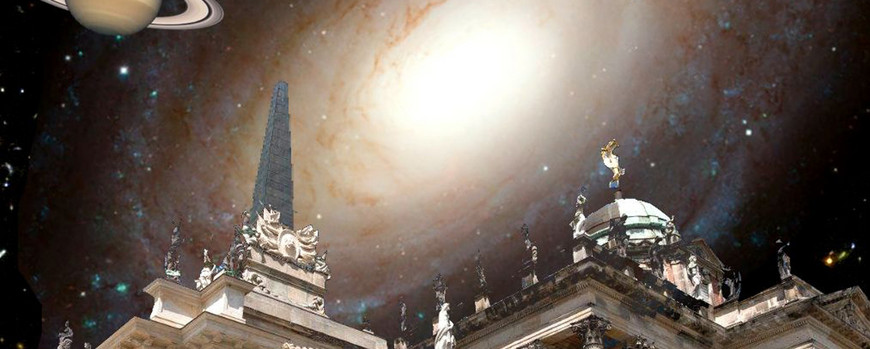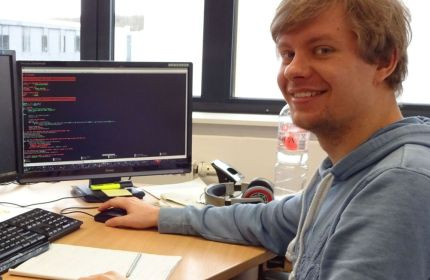Astrophysics | Master

Whether they focus on technical developments or basic research, astrophysicists seek to substantiate and expand our understanding of the Universe and its constituents. The English-language master’s degree in astrophysics at the University of Potsdam prepares you to participate in this field.
| Name | Astrophysics |
| Degree | Master of Science |
| Standard period of study | 4 semesters |
| Credit points | 120 |
| Language of instruction | English |
| Start of program (1st semester) | Sommer- und Wintersemester |
| Campus | Golm |
| Fees & Charges | Semester fees and charges: yes Tuition fees: no |
Program Content
The research-oriented master’s degree program in astrophysics conveys comprehensive knowledge about the structure and evolution of the Universe and its constituents. You will gain a profound understanding of the many complex physical processes that provide the foundation to explain cosmic phenomena. You will also develop a methodological toolkit that enables you to explore and analyze these phenomena. Subject-specific competences in the program include the discipline’s core fields (stars, stellar evolution, galaxies, cosmology) and a variety of more specialized topics (for example: galaxy clusters and large-scale structures, interstellar and intergalactic gas, stellar winds, solar physics, cosmic magnetic fields, planetary science, astroparticle physics, gravitational waves, astronomical instrumentation and observation methods, computer simulations, and others).
Student„The main reason for my decision to study at the University of Potsdam was the area’s strength in astrophysical research and the presence of external research institutes that collaborate with the University. The buildings here in Golm are new and they provide a perfect learning environment; we have plenty of space for studying also within the physics department. There’s an ideal number ratio between professors and students, which is another major plus. (Photo: Philipp Richter)“
Course Objective and Future Career Options
As a graduate of the master’s degree in astrophysics you will be able to independently plan and conduct research projects in the field of astrophysics. You will be able to identify subject-specific problems, find appropriate methods to address them, and present the results of your work in an appropriate form.
Career prospects for our graduates include scientific institutions and universities, high-tech and information technology, knowledge transfer and the media. Your analytical training and solid English skills will qualify you for numerous, internationally oriented professions.
Prerequisites for Master’s Studies
Important prerequisites for the master’s degree program include a solid foundation in physics and mathematics and a deep interest in astrophysical phenomena and topics.
In general, the prerequisite for master’s studies at the University of Potsdam is an academic degree, such as a bachelor’s degree. Your first degree should be in a subject that is relevant to your course of study, for example in physics. You should be able to provide documentation of at least 60 credit points in physics and mathematics. Furthermore, you should have completed at least 6 credit points in astrophysics.
Because this degree program is taught in English, we expect good English skills that correspond at least to the C1 level of the Common European Reference Framework for Languages.
You can learn more about the subject-specific admission requirements in the respective Admission Regulations.
Program Structure
This four-semester master’s degree program requires the completion of 120 credit points. The following overview provides information about the weighting of individual modules and types of courses.
For additional information, please consult the subject-specific Degree Regulations or the Departmental Advisory Office.
Modules | Credit points |
|---|---|
| Mandatory modules | 60 CP |
| Astrophysics I | 12 CP |
| Astrophysics II | 6 CP |
| Higher Physics | 12 CP |
| Methods of modern Astrophysics | 12 CP |
| Topics in advanced Astrophysics | 12 CP |
| Supplementary topics | 6 CP |
| Preparatory Phase for the Master’s Thesis | 30 CP |
| Introductory project | 18 CP |
| Research training | 12 CP |
| Master's Thesis | 30 CP |
| Total | 120 CP |
Advantages at a Glance
Potsdam is one of Germany’s centers of astrophysical research. There is a broad range of astrophysical topics covered in on-going research projects at the Department of Physics and Astronomy at the University of Potsdam, the Leibniz Institute for Astrophysics Potsdam (AIP), the Deutsches Elektronen-Synchrotron (DESY), and the Max Planck Institute for Gravitational Physics.
As a student in the master’s degree program in astrophysics you are involved in current research questions from the very beginning. You have the latest means of working with scientific data at your disposal, for example for comprehensive spectral analyses or state-of-the art computer simulations. You also have access to an international network that facilitates the use of large telescopes and observational data from spacecraft missions. This means that teaching and research are right on the cutting edge. More than 20 lecturers at the University of Potsdam offer courses in all of the subfields of modern astrophysics, and as a graduate in the master’s degree in astrophysics you can particularly benefit from this comprehensive range of courses.
Furthermore, your studies at the University of Potsdam give you an outstanding advantage in terms of location: thanks to an exemplary network of nationally active research institutions and a modern university campus you are in a great position to develop your academic interests and pursue them in a goal-oriented way.
The University of Potsdam has taken into account the actual conditions among students and introduced the option for part-time study into several degree programs. This also pertains to Astrophysics. For more information, go to part-time studies at the University of Potsdam.
Application
Have you decided to study the Master's Program in Astrophysics at the University of Potsdam? Then you should take the next step on the application pages to find out more about current application and enrollment procedures.

Contact
Department of Physics and Astronomy
Prof. Dr. Philipp Richter | Departmental Advising
Important Links
This description is based in part on information from the subject-specific regulations for a master’s degree in astrophysics at the University of Potsdam dated January 20, 2016 (AmBek No. 05/16, p. 179).


